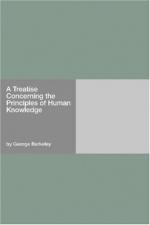18. The existence of external bodies wants proof.—But, though it were possible that solid, figured, movable substances may exist without the mind, corresponding to the ideas we have of bodies, yet how is it possible for us to know this? Either we must know it by sense or by reason. As for our senses, by them we have the knowledge only of our sensations, ideas, or those things that are immediately perceived by sense, call them what you will: but they do not inform us that things exist without the mind, or unperceived, like to those which are perceived. This the materialists themselves acknowledge. It remains therefore that if we have any knowledge at all of external things, it must be by reason, inferring their existence from what is immediately perceived by sense. But what reason can induce us to believe the existence of bodies without the mind, from what we perceive, since the very patrons of Matter themselves do not pretend there is any necessary connexion betwixt them and our ideas? I say it is granted on all hands (and what happens in dreams, phrensies, and the like, puts it beyond dispute) that it is possible we might be affected with all the ideas we have now, though there were no bodies existing without resembling them. Hence, it is evident the supposition of external bodies is not necessary for the producing our ideas; since it is granted they are produced sometimes, and might possibly be produced always in the same order, we see them in at present, without their concurrence.
19. The existence of external bodies affords no explication of the manner in which our ideas are PROCUCED.—But, though we might possibly have all our sensations without them, yet perhaps it may be thought easier to conceive and explain the manner of their production, by supposing external bodies in their likeness rather than otherwise; and so it might be at least probable there are such things as bodies that excite their ideas in our minds. But neither can this be said; for, though we give the materialists their external bodies, they by their own confession are never the nearer knowing how our ideas are produced; since they own themselves unable to comprehend in what manner body can act upon spirit, or how it is possible it should imprint any idea in the mind. Hence it is evident the production of ideas or sensations in our minds can be no reason why we should suppose Matter or corporeal substances, since that is acknowledged to




